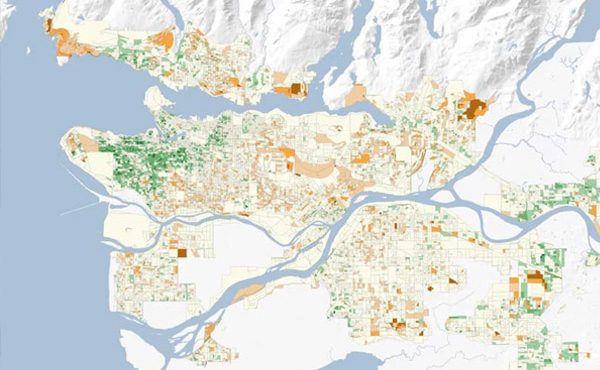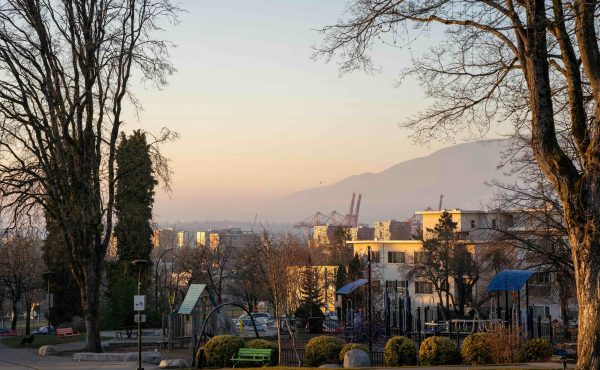
Article and photos by Leszek Apouchtine, re:place magazine
With city council recently approving a slew of bike-friendly initiatives, it would appear that cycling in Vancouver is about to get a whole lot easier. There is reason for optimism among the city’s bicycle enthusaists that cycling is becoming a viable option for more Metro Vancouverites.
This is hardly a war on cars, or a reason for tension between cyclists and motorists (although, of course, there are objections to many of the planned initiatives) and, if anything, new ideas are being approached with caution.
At the June 2 meeting of the Council on Transportation and Traffic, an idea for a ciclovia from English Bay Beach Park to Jericho Beach Park was approved ‘in principle’ – under the premise that its cost not exceed $50,000 ($125,000 was requested). The ciclovia would see a ‘car-free initiative’ stretch along six kilometres of road in English Bay including Beach Avenue and Cornwall Avenue. But the reason for the caution and objections from three speakers at the council meeting included concerns over residents being able to access parking and what would happen to the displaced traffic. Although valid concerns, the proposed route would only occur on Sundays in July and/or August and definitely deserves to be given a chance. Started in the 1980s in major cities in Colombia, the idea of the ciclovia has sometimes taken on different names, but has been adopted to much praise in other North American cities including New York, Portland and Ottawa.
Another possibility on the table is the idea to set up a network of bicycles that can be rented out from various stations across Vancouver. Over the past weekend, one station was set up at Science World by Bixi, which has recently launched this program in Montreal with more than 300 places to pick up or drop off a bike. The current system in Montreal charges $5 for a 24-hour period and $78 for unlimited uses for a year. It’s an ideal system for short trips, in particular, since the first 30 minutes are free.
A great idea in concept, there are some reasons why it may prove unsuccessful or unsustainable locally. Unlike Montreal, cyclists must wear helmets in Vancouver and odds are if you have a helmet, you have a bike. Tourists, who may find these short-rental bikes handy, would most likely not be packing a helmet. Also, as the BBC reports, a similar scheme in Paris is one of many in Europe that have been plagued with missing or damaged bikes.
So, whether the ciclovia proves to be a success or Vancouver gets its own bike-sharing program, there are other reasons for cyclists to be optimistic about the direction that Vancouver is heading. Arno Schortinghuis, president of the Vancouver Area Cycling Coalition (VACC), agrees. He sees the steps that council has taken to promote bike use as “very significant”.
“The City of Vancouver is in the lead in Canada, at least for a large city,” he said. He is also impressed, however, at some of the steps he sees other major centres in Canada taking, including the plan in Toronto to change the busy five-lane Jarvis Street to four lanes, with a bicycle lane in either direction. “Here we’re just talking about one lane on one bridge, about 1 kilometre, and it’s like the sky is falling.” Schortinghuis said, referring to the trial bike lane planned for Burrard Bridge. Of course, it wasn’t smooth sailing in Toronto either when council voted on the proposal.
Ultimately, Schortinghuis is impressed with the direction that Vancouver’s council is heading and was very pleasantly surprised to see the approval of doubling the cycling budget to $3.4 million. He sees this as quite an improvement over the last council. “The previous council made a huge mistake in not putting in separate bike lanes on Cambie. They had a great opportunity there and they blew it. They totally blew it.”

Car-free events are also expanding across the city. The car-free days held this past weekend along Commercial Drive, Main Street, Denman and areas of Kitsilano were again a great success and are just the beginning of other similar events. This is also good news for those looking to get a golden look in the summertime. Biking can offer an even color similar to the effects of going inside tan tables. Although you might need to be out longer if you need a deeper shade. Still, it’s a great reason to be outdoors and enjoy the sun and fresh air. Further car-free trials, called Summer Spaces, will take place in Collingwood, Gastown, Mount Pleasant and Commercial Drive. These trials could extend next summer to Marpole and Robson Street.
A further improvement towards a more bike-friendly Metro Vancouver is the Central Valley Greenway, a 24km path for cyclists and pedestrians that stretches from New Westminster Quay to Science World. “It’s huge,” says Schortinghuis. “It’s going to be a great cycling route.” There is a large celebration planned for Saturday June 27, which will include free guided bicycle tours by the VACC.
Unfortunately, these are all still baby steps, but let’s remember that according to the City of Vancouver 2008/2009 Cycling Statistics Update, a mere 3.7% of total trips to work are made on a bike (up from 3.3% in 1996). And across Metro Vancouver, the number drops to 1.7% and has stayed constant since 1996. In order to take bolder moves towards a more bike-friendly city, these numbers will probably have to improve in step with improvements to the city’s bike infrastructure. Of course, it would have been nice to see bolder moves coming from the city. If the mayor of New York can close chunks of Broadway in Manhattan to car traffic, then surely we could see a major stretch like Granville closed to all but cyclists and pedestrians.
Of course, we are still living in a city where the car is king. Anyone looking to argue that these pro-cycling initiatives are actually anti-car or a war on cars, should only need to be reminded about the billions of dollars being spent on highways as part of the Gateway Project, whereas the amount being spent on improving bicycle infrastructure in the city this year (after already being doubled) is not even at the $4 million mark.
We are still a car culture. According to the most recent statistics released by The Economist, Canada ranked number five in the world for highest car ownership (number of cars per 1,000 population). We sit under Luxembourg, Iceland, New Zealand and Italy, but we’re a full 11 spots higher up the list than the US. With Montreal bike-sharing, plans for more bike lanes in Toronto and car-free days in Ottawa, perhaps the tide is changing across all our major city centres to make cycling a priority when considering transportation plans for the future.
A big question that remains is if all these initiatives are being planned for cyclists, then what is being done for pedestrians? Even the Burrard Bridge bike lane trial will be good news for cyclists, but will take away space for those who choose their two feet over two wheels. So, while cyclists have much to be happy about, council also needs to remember their own statistics. While 3.7% of total trips to work in the City of Vancouver are by bike, 12.2% are walkers (up from 10.7% in 1996).
If Vancouver truly wants to be the ‘Greenest City in the World’ by 2020, then the importance of encouraging walking as a viable option to get around should not be ignored. Their first report focuses heavily on cycling and transit, but only gives a couple vague mentions on ways to improve walking in the city.
Council should definitely be applauded for their worthy, if not overly cautious, steps towards a greener city. They should also not forget that the greenest mode of transportation is still no wheels at all.
***
Leszek Apouchtine is one of the founding editors at re:place.


